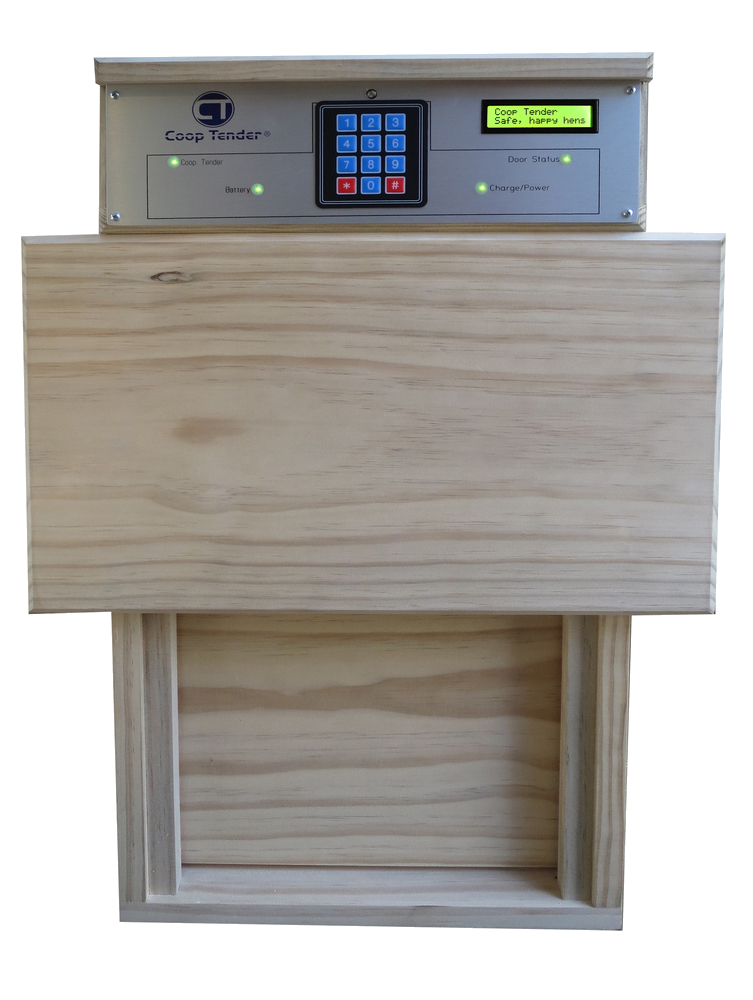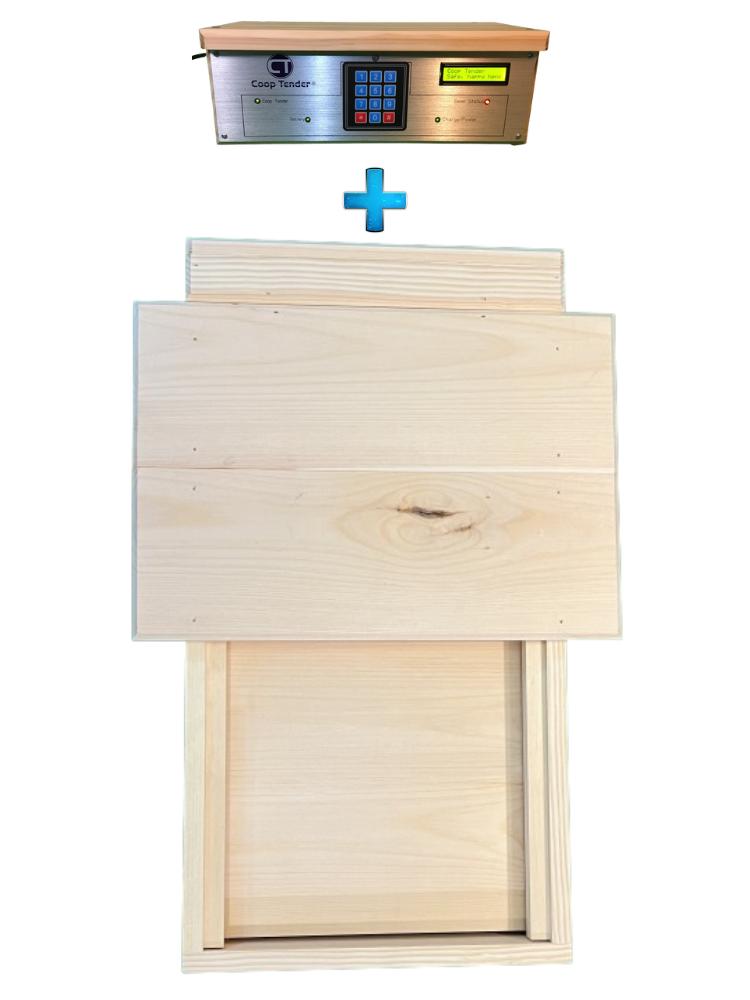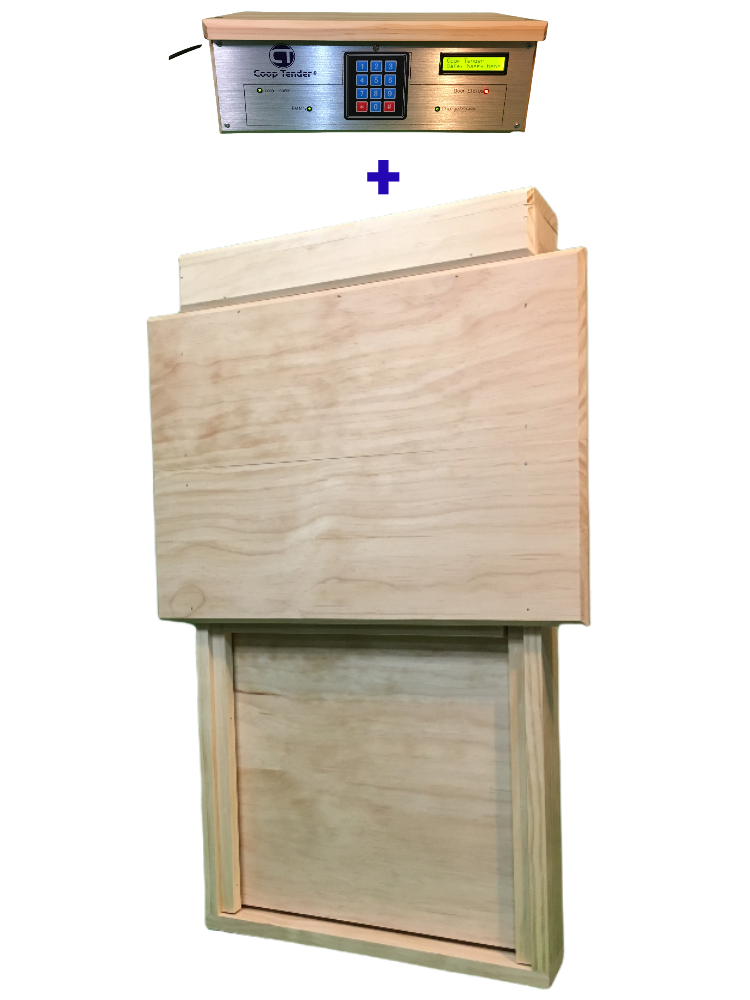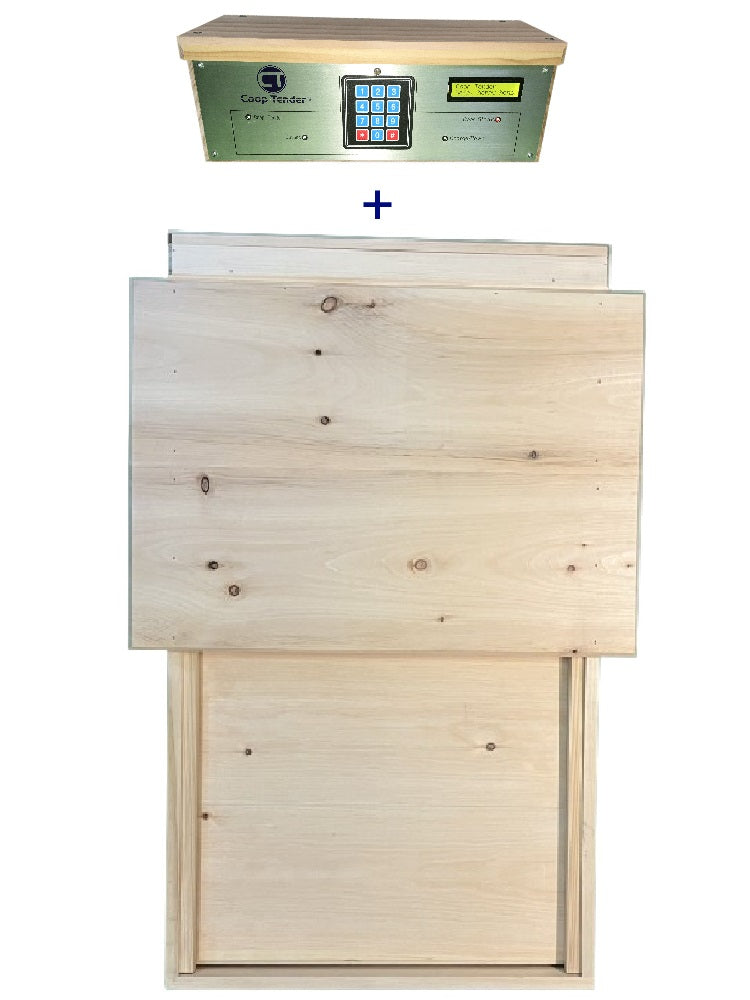As a new chicken owner, you're probably wondering: do chickens need automatic doors, or is this just another expensive gadget marketed to backyard poultry enthusiasts? It's a fair question, especially when you're already investing in coops, feeders, bedding, and other essential supplies.
The honest answer is nuanced. Chickens have survived for thousands of years without automatic doors, but modern backyard flocks face different challenges than their wild ancestors. Understanding whether chickens actually need automatic doors requires examining your specific situation, lifestyle, and flock management goals.
Let's explore the real factors that determine if automatic doors are necessary, helpful, or optional for your particular circumstances.
When Do Chickens Need Automatic Doors? The Decision Framework
Lifestyle and Schedule Factors
Do chickens need automatic doors if you have a predictable schedule? Even with consistent routines, life happens. Work emergencies, traffic delays, family obligations, and travel plans all disrupt the best intentions. Chickens don't understand human scheduling conflicts - they simply need protection when dusk arrives.
If you've ever rushed home worried about closing your coop before dark, you already understand the stress that manual management creates. This anxiety affects both you and your flock, who may sense your urgency and become agitated during evening routines.
The Travel and Flexibility Question Do chickens need automatic doors for owners who travel frequently? Absolutely. Finding reliable chicken-sitters becomes increasingly difficult, especially for overnight or weekend trips. Automatic doors eliminate the need for twice-daily visits from neighbors or pet sitters.
Even occasional travel benefits from automation. Weekend getaways, family emergencies, or extended work days become possible without compromising your flock's safety.
Predator Pressure Assessment
High-Risk Environments Do chickens need automatic doors in areas with significant predator pressure? This question answers itself after the first predator attack. Raccoons, foxes, coyotes, and other nocturnal hunters are persistent, intelligent, and motivated by easy meals.
Rural properties, wooded areas, and regions with large predator populations make automatic doors essential rather than optional. The cost of one lost chicken often exceeds the investment in automation, not counting the emotional impact of preventable losses.
Urban and Suburban Considerations Even city chickens face predator threats. Raccoons thrive in urban environments, and domestic dogs pose risks in many neighborhoods. Do chickens need automatic doors in suburbs? The answer depends on your specific location and local wildlife patterns.
Urban chicken owners often discover unexpected predator activity only after experiencing losses. Prevention through automation proves more effective than reactive measures after attacks occur.
Flock Size and Management Complexity
Small Backyard Flocks Do chickens need automatic doors if you only have 3-4 hens? Small flocks are often more vulnerable because they lack the alertness and defensive capabilities of larger groups. Individual chickens in small flocks may also be more precious to their owners, making protection investments emotionally worthwhile.
Small flock management seems simpler initially, but the proportional impact of losing even one chicken is significant both emotionally and economically.
Large or Commercial Operations Do chickens need automatic doors for larger flocks? The time savings alone justify automation for substantial poultry operations. Managing multiple coops manually becomes labor-intensive and prone to human error.
Larger operations also face greater economic losses from predator attacks, making automation a business necessity rather than a convenience feature.
Do Chickens Need Automatic Doors, or Are There Other Options?
Manual Management Realities
The True Cost of Manual Operation Many new chicken owners initially resist automation, believing manual door management is simple and cost-effective. However, the reality includes:
- Time investment: 10-15 minutes daily for door management
- Weather exposure: Daily trips regardless of rain, snow, or heat
- Schedule inflexibility: Twice-daily commitments without vacation breaks
- Stress factors: Anxiety about timing and security
When calculated over several years, manual management often costs more in time and stress than automation would have required initially.
Partial Solutions and Their Limitations Some owners attempt compromise solutions: timers without security features, simple mechanical systems, or neighborhood assistance arrangements. These approaches address some concerns while creating others.
Mechanical timers fail in extreme weather. Neighbor assistance arrangements become burdensome over time. Simple systems lack the reliability that predator protection requires.
Comparing Investment Options
Security Fencing vs. Automated Doors Do chickens need automatic doors if you have excellent perimeter fencing? Even the best fencing has limitations. Digging predators, climbing threats, and fence failures all compromise security. Automatic doors provide redundant protection that fencing alone cannot achieve.
Quality fencing costs significantly more than automation while providing less comprehensive protection. The combination of good fencing AND automatic doors offers optimal security for valuable flocks.
Alternative Automation Options Do chickens need automatic doors specifically, or would other automation suffice? Feeding automation, watering systems, and lighting controls all improve flock management, but none address the fundamental security and access challenges that door automation solves.
Each automation system serves different purposes. Door automation uniquely combines security, convenience, and flock welfare benefits that other systems cannot provide.
The Economics: Do Chickens Need Automatic Doors from a Financial Perspective?
Investment vs. Loss Prevention
Calculating Risk Exposure Do chickens need automatic doors when you consider replacement costs? Average heritage breed hens cost $25-40 each, with rare breeds commanding higher prices. A single predator attack eliminating 4-6 chickens creates a $150-250 loss - approaching the cost of basic automation.
Productive laying hens represent ongoing value through egg production. Losing established layers means purchasing replacements AND losing months of production while new hens mature.
Time Value Analysis Do chickens need automatic doors when you factor in labor costs? Daily door management requires 700+ hours annually at 2 trips per day. Valuing your time at minimum wage levels, manual management costs exceed automation within 2-3 years.
Professional or highly-skilled individuals with higher hourly values find automation pays for itself within months rather than years.
Long-Term Value Considerations
Operational Flexibility Benefits Do chickens need automatic doors for lifestyle benefits? The freedom to travel, work late, or handle emergencies without arranging chicken care provides immeasurable value to many owners.
Career opportunities, family obligations, and social activities all become easier when chicken management doesn't require rigid scheduling adherence.
Property Value and Appeal Do chickens need automatic doors for resale considerations? Modern homebuyers increasingly value smart home features and automated systems. Professional coop installations with automation appeal to potential buyers interested in chicken keeping.
Even if you don't plan to sell, automation demonstrates commitment to quality and modernity that many find personally satisfying.
Real-World Situations: When Do Chickens Need Automatic Doors?
Scenario 1: New Urban Chicken Owners
Situation: First-time owners with 4 hens in a suburban backyard Question: Do chickens need automatic doors for beginners? Analysis: Urban predators, learning curve challenges, and lifestyle integration make automation valuable for newcomers Recommendation: Consider automation early to establish good habits and prevent losses during the learning phase
Scenario 2: Rural Homesteaders
Situation: Experienced farmers with multiple animal species and substantial acreage
Question: Do chickens need automatic doors on established homesteads? Analysis: High predator pressure, time management challenges, and economic considerations favor automation Recommendation: Automation becomes essential for security and operational efficiency
Scenario 3: Elderly or Mobility-Limited Owners
Situation: Retirement-age chicken enthusiasts with physical limitations Question: Do chickens need automatic doors for owners with mobility challenges? Analysis: Daily walking requirements, weather exposure, and physical demands make automation nearly essential Recommendation: Automation improves safety and sustainability for continued chicken keeping
Scenario 4: Family with Young Children
Situation: Parents introducing children to animal husbandry through chicken keeping Question: Do chickens need automatic doors for family operations? Analysis: Schedule flexibility, teaching opportunities, and loss prevention support family goals Recommendation: Automation reduces stress and creates positive experiences for children
Scenario 5: Small-Scale Commercial Egg Production
Situation: Owners selling eggs locally or at farmers markets Question: Do chickens need automatic doors for commercial operations? Analysis: Business continuity, loss prevention, and operational efficiency directly impact profitability Recommendation: Automation becomes a business necessity rather than convenience feature
Frequently Asked Questions: Do Chickens Need Automatic Doors?
Do chickens need automatic doors if I'm retired and home all day?
Even retired owners benefit from automation. Weather, health issues, family emergencies, and travel opportunities all create situations where manual management becomes difficult. Automation provides peace of mind and operational flexibility regardless of availability.
Do chickens need automatic doors in winter when they stay inside more?
Winter actually increases the need for automation. Harsh weather makes daily trips uncomfortable and potentially dangerous for owners. Shorter days require precise timing that manual management struggles to maintain consistently.
Do chickens need automatic doors if my coop is close to my house?
Proximity doesn't eliminate predator risks or schedule inflexibility. Close coops make manual management easier but don't address the fundamental challenges of twice-daily commitment and security concerns.
Do chickens need automatic doors when I have a secure run attached to the coop?
Attached runs provide some protection but don't eliminate the benefits of automation. Access timing, weather protection, and ultimate security still benefit from automated door management.
Do chickens need automatic doors if I work from home?
Home-based workers often have unpredictable schedules with calls, meetings, and deadlines that interfere with chicken management. Automation eliminates the stress of managing both professional and poultry responsibilities simultaneously.
Do chickens need automatic doors for just a few chickens?
Small flocks often receive more individual attention from their owners, making each chicken more valuable emotionally and economically. The proportional impact of losing even one chicken justifies protection investments for small flocks.
Making Your Decision: Do Your Chickens Need Automatic Doors?
After examining lifestyle factors, security concerns, economic considerations, and management challenges, most chicken owners discover that the question isn't really "do chickens need automatic doors?" but rather "how long can I manage without them?"
The Honest Assessment
You probably need automatic doors if:
- You value travel and schedule flexibility
- Your area has any predator activity
- You work unpredictable hours or have family obligations
- You want to expand your flock in the future
- You've ever worried about timing or security
You might manage without automatic doors if:
- You have absolutely predictable schedules
- You live in areas with minimal predator pressure
- You have reliable backup assistance available
- You genuinely enjoy the twice-daily routine
- Budget constraints require gradual investments
Making the Investment Decision
The most successful chicken owners often wish they had invested in automation earlier rather than later. Learning this lesson after predator losses or schedule conflicts proves more expensive than proactive planning.
Ready to explore your options?
For detailed information about automatic door systems, features, and installation guidance, read our comprehensive guide to choosing the right automatic door system. Compare technologies, assess your specific needs, and make an informed decision about protecting your flock.
Your chickens may not technically "need" automatic doors to survive, but they deserve the security, consistency, and protection that modern automation provides. More importantly, you deserve the peace of mind and lifestyle flexibility that comes with professional flock management systems.







Leave a comment